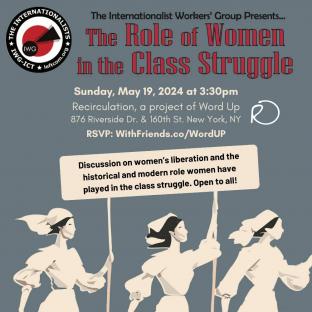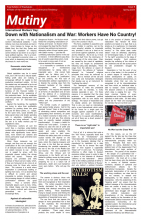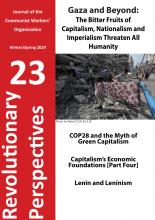May 2024
MDF Meeting Introduction
Im afraid there is no discussion report because we didnt have such a good turnout this time and we meandered a fair bit. I am attaching my introduction to the meeting anyway event though im not convinced its very well thought out and organised.
Single Issue Campaigns and Reformism
I’ve started this several times now but I think the best place for me to start is with what is revolutionary movement. If we are supporting the creation of a society to replace capitalism then we really have to be focused on and supporting working class action that leads in that direction. This I’m afraid demands thought and discussion leading to an understanding of events too. Its not enough to say you want revolution if you don’t try to understand what that means and how it comes about. Revolution demand thought. In addition, its not enough to take what is said at face value and that is hard enough when dealing with Russia state communism or UK democracy let alone when looking at what the trots and trade unions say and even more difficult when apply to various branches of anarchism and feminism and black nationalism etc.
In the dim and distant past we would have focused on strikes at the point of work against employers (who would have been private owners) but I’m not so sure that is quite as clear cut today in the days of a very powerful structures of state capitalism and the gradual isolation of workers in smaller employers with large numbers of sub contractors. However what I would think we do still have to emphasise as the starting point here is independent working class action. Action that is getting out of the control of state employers and state institutions like the TUs, Labour Party ACAS etc etc. Certainly that’s my perspective today in a period when I see little struggle by the class, I am looking and, to be honest in this current period, waiting for signs of independent action.
I think all of us in this room reject left wing politics Labour party and extreme left because they aim to take over wc struggle of limit it to support for state capitalist systems ie nationalisation parliamentary democracy and maintain wage labour systems. I am reminded here of an image in the press at the start of February of a large demonstration in support of NHS - sounds positive so far but the image was a mass of blue banners and posters which seemed to me to indicated who was in control of that struggle. Save the NHS is a popular slogan for many reasons – lots of workers work in it, it provides social wage of remainder of the working class but it can also be distorted by the TUs and the left when it becomes, save the state nationalisation, keep Britain strong and healthy and the outright nationalism of Britain is best.
The left talk in the language of socialism and of support for working class but fundamentally they all argue to improvements to the present system through voting for left wing candidates at elections but also use this to divert class responses to issues of wages, health care, unemployment, health and safety, etc. They do this particularly through single-issue campaigns designed to influence those in power and change legislation. They present these campaigns as the genuine struggle but ultimately try to prevent outright confrontation with the state because that is what single issue campaigns do. By focusing on specific issues whether support the NHS, equal opportunity legislation, safety issues for workers or customers, (trying to pick positive sounding targets) it deflects from the development of struggle into a broad confrontation with the capitalist system which in reality now cannot afford to make workers better off as a whole. However this poses the problem of how we react within struggles
Another type of such struggles are the general, non-employment related campaigns around eg nuclear weapons, anti fracking, save the whale, save the rainforest etc. Laudable aims of course but do those pose the possibility of revolution? No. Such campaign as just as easily waged by factions of the bourgeoisie and middle classes and even if successful, will primarily spread that idea that reform is possible and make us all better of. I expect anyone here will at very least feel sympathy with the campaigns to put an end to child sexual exploitation gangs that we appear to have in the UK nor the US schoolchildren’s campaign to protect themselves against school invasions but we have to ask honestly if such campaigns can lead to revolution. I don’t think it can be said either that experience of such struggles generates a revolutionary consciousness rather than a reformist ideology.
This is precisely why its important to look for signs of growing wc independence in struggle against the state instead of single issue campaigns that turn the wc into support for the capitalism state. As an example I would refer to the West Virginia Teachers strike which along with other things raised issues of defending education but it was a illegal strike that went well beyond the limits of one day demonstrations and took to the streets, picketed streets and demonstrating against state politicians. It is such extensions of struggle that pose issues of wc revolution.
The left sets out to lead such campaigns even if they did not set them up in the first place, this is in itself a problem of substitutionism and it seems to me that anarchism falls into this trap too. Only the wc as a whole can make a revolution that changes social behaviour not a select group of leaders creating campaigns and struggles and telling others how to act.
The system is in decline and now, year on year, workers will in general be becoming worse off. Single issue campaigns pose questions of success or failure only in terms of influence of the state and therefore of immediate goals, of short terms gains in income, in changes in legislation, in improvements in system. The struggle stops when the campaign succeeds or fails. This means they isolated workers involved from the rest of the class and prevent the generalisation of struggle. In terms of that NHS action, clearly health systems are important to workers wellbeing but by focusing on defend the NHS the struggle is glued to supporting the existing state of affairs in the NHS (with importantly all the cuts that have been imposed so far) and in general the existing capitalist state. The leftists continually justify this by focusing arguments on defending workers benefits. Their argument goes - if you don’t defend what there is at present no matter who else is leading that campaign, then workers will be worse off. This is an argument which sees single issue campaigns as the only way to struggle and a goal in themselves and attempts to stop thought and analysis of what can bring about to revolutionary change
We have to reject this approach and call to go beyond such limited struggles. I had a email from Shug yesterday expressing interest in the topic and related to what he termed anti=austerity actions To quote
I felt it politically necessary to say, when campaigning against cuts etc, that the cuts were systemic, global, and for capital, inescapable. But to argue that fighting for something that is either unobtainable given the global crisis, or if won is only won temporarily, is understandably not an argument that goes down well. We can offer a political perspective on the cuts when intervening from outside; it's not so easy when participating in struggle to be saying what appears to be 'let's keep struggling, but chances are we aint gonna win, by the way'
So even if that such single issue struggles are controlled and are used by the lefts and indeed anarchists but it may well represent at the same time a defence of wc interest at some level - so the issue is how do revolutionaries respond and im interesting to see how others respond here? From my perspective, it can only be making clear the differences to those reformist leaders and making calls for extension and generalisation of all such struggles beyond their limitations but that is rather poor response to the problems Shug explained so clearly .
There is another variant of single issue campaigns that are possible harder to pin down and understand. These are broader, social campaigns ie anti fascism, anti-racism or black power, under the feminism banner we have the metoo movements at present and the recent Women’s day actions, which have both been quite substantial. These campaigns may again at specific times represent the interest of sections of the wc but at root they start from ideas that reject the unity of working class by identifying the defence of oppressed groups as their priority for struggle. So again whilst we start from the view that all people are equal and should be allowed to follow their own inclinations and should be treated equally- this does not happen under capitalism – and the campaigns in favour of such groups become simply a matter of improving capitalism ie of reformism, because these groups have no perspective of unity and confrontation with the essential elements of capitalism. I think it important therefore to distinguish between wc interests and bourgeois campaigns because these campaigns will clearly represent interests of ruling class groups too. I saw a banner used on one of the recent Womens Day march – The Revolution will be Feminist. Without knowing precisely what the person meant by this i will label it a bourgeois slogan representing a bourgeois movement. It does not represent class interests at all - only the idea that feminist struggle is more important and that gender is the most important division in society. Equally I was interested by the statements by a black transgender female model on resigning from Labour LBGT group. Her approach presumably complicates all the recent libcom discussions on transphobia:
“Because most of ya’ll dont even realise or refuse to acknowledge that your existence privilege and success as a race is build on the backs, blood and death of people of colour. Your entire existence is drenched in racism. From micro-aggressions to terrorism you guys built the blueprint for this s*. Once white people begin to admit that their race is the most violent and oppressive force of nature on Earth … then we can talk.”
Sorry but this is not revolutionary dialogue this is bourgeois ideology. It is bourgeois individualism masquerading as racial identity
So supporting equality should not be distorted to having to support all movements in favour of oppressed groups. The metoo campaigns etc are clearly bourgeois in origin whereas I hesitate to say that about eg the strike in Spain even albeit a limited one day strike. Yet criticising the campaigns in this way does not mean not having sympathy or empathy with the situation of women being violated, people being racially abused, children being sexually abused or indeed with American children being scared to go to school. The question that we should be asking is what can be done to solve these problems not …….. what do we do now!
Ok ive picked up on a couple of isolated statements, but this is precisely the problem with this type of single issue campaign they are essentially individualistic, every individual can potentially have different opinions and ultimately there is no prospect of full unity – hence no revolution, just changes to capitalism That prospect only comes when such struggles are allied to independent working class struggle and the extension of workers struggles which is why I keep using the example of the Int Womens day march in Russia in 1917 which sparked of a wc revolt.
Start here...
- Navigating the Basics
- Platform
- For Communism
- Introduction to Our History
- CWO Social Media
- IWG Social Media
- Klasbatalo Social Media
- Italian Communist Left
- Russian Communist Left
The Internationalist Communist Tendency consists of (unsurprisingly!) not-for-profit organisations. We have no so-called “professional revolutionaries”, nor paid officials. Our sole funding comes from the subscriptions and donations of members and supporters. Anyone wishing to donate can now do so safely using the Paypal buttons below.
ICT publications are not copyrighted and we only ask that those who reproduce them acknowledge the original source (author and website leftcom.org). Purchasing any of the publications listed (see catalogue) can be done in two ways:
- By emailing us at uk@leftcom.org, us@leftcom.org or ca@leftcom.org and asking for our banking details
- By donating the cost of the publications required via Paypal using the “Donate” buttons
The CWO also offers subscriptions to Revolutionary Perspectives (3 issues) and Aurora (at least 4 issues):
- UK £15 (€18)
- Europe £20 (€24)
- World £25 (€30, $30)
Take out a supporter’s sub by adding £10 (€12) to each sum. This will give you priority mailings of Aurora and other free pamphlets as they are produced.
ICT sections
Adverts
NYC Public Meeting
THE ROLE OF WOMEN IN THE CLASS STRUGGLE
PUBLIC MEETING AND DISCUSSION
Discussion on women's liberation and the modern role women have played in the class struggle. Open to all!
When: Sunday, May 19th at 3:30 PM.
Where: 876 Riverside Dr. & 160th St. New York, NY.
Link to register: withfriends.co
Internationalist Workers' Group
Recent publications
May 2024
Aurora is the broadsheet of the ICT for the interventions amongst the working class. It is published and distributed in several countries and languages. So far it has been distributed in UK, France, Italy, Canada, USA, Colombia.
Out now!
Journal of the Communist Workers’ Organisation -- Why not subscribe to get the articles whilst they are still current and help the struggle for a society free from exploitation, war and misery? Joint subscriptions to Revolutionary Perspectives (3 issues) and Aurora (our agitational bulletin - 4 issues) are £15 in the UK, €24 in Europe and $30 in the rest of the World.
Written by Jock Dominie. £12, 276pp.
The Russian Revolution remains a landmark event in history. For the bourgeois historians, the October Revolution is thought to be a tragedy that set back the achievements of the “democratic” February Revolution, and allowed the Bolsheviks to wreak havoc on their citizens and the world. For the Stalinists, the events of 1917 paved the way for the birth of the USSR, which they point to as a prototypical example of “socialism in one country”. In reality, the February and October Revolutions were both part of the same proletarian revolution.
The book can be ordered by emailing us at uk@leftcom.org and asking for our banking details, or by donating the cost of the publications required via Paypal using the “Donate” button. Postage charges should be added. If in the UK, and paying direct to our bank account, first class postage is free. If via Paypal add £2. For Europe cost of a copy with postage is €20 (EUR), for Australia it is $42 (AUD) and for the USA and anywhere else in the world it is $27 (USD).
User login

This work is licensed under a Creative Commons Attribution 3.0 Unported License.







